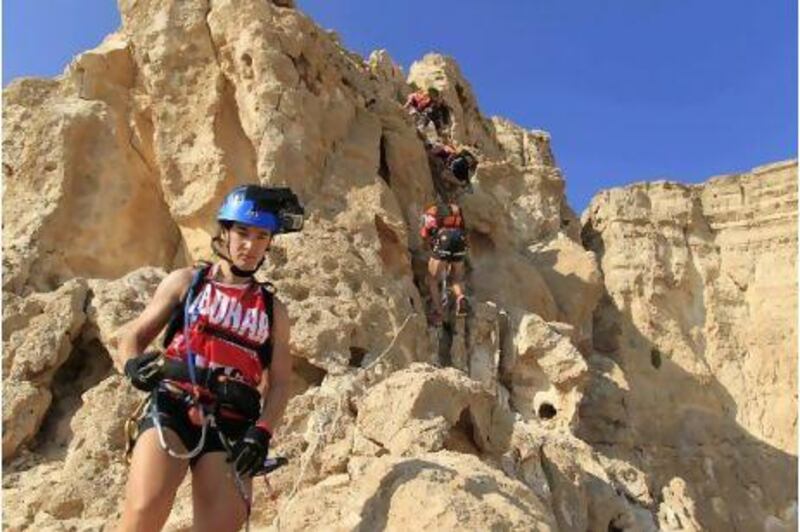LIWA // For the leading UAE team in the Abu Dhabi Adventure Challenge, starting a two-day trek through the Empty Quarter felt like home advantage.
The thrice weekly training sessions in the desert outside Dubai paid off for 2XU BlackBerry during yesterday's 91km mountain bike section.
The section involved racers weaving around the immense dunes, with a few falling and some walking their bikes for the majority of the race.
Some of the other teams had to train in snow, and while snow can have a similar consistency to sand, there is the little matter of the temperature.
"The other teams are quite new to this," Adam Marcinowicz said.
"It's a different type of racing compared to the past few days, so I think it's all going to come together now [for us]."
During the two-day trek, teams carry their own tents, food and water. Racers wear lightweight, moisture resistant overshoes called gaiters to keep their shoes sand-free. Many teams also carry sticks so that the fastest member can leave lines in the sand to follow.
2XU BlackBerry did not pack the sticks. "We're just going to run with only our sand gaiters and our shoes," Marcinowicz said.
Their confidence seems extraordinary given the task ahead; navigating 116km through the Empty Quarter, the world's largest uninterrupted body of sand.
While UAE teams are able to train in sand, creative international teams found a substitute: snow.
Living in Colorado, in northern US, Jari Kirkland of Team Explore adjusted her training and steeled her thoughts against the heightened daytime temperatures in the desert.
"I live in Colorado, where it's been snowing, so I can't train for this. I haven't been in the heat in a long time," Kirkland said. "Mentally, I just knew it was coming and there was nothing I could do about it."
Team Accelerate ran in downy snowdrifts in Edinburgh, Scotland.
"It's got similar resistance," said Dan Halliday, adding that the team have had little practice running in sand.
Team Accelerate hoped innovation would compensate for lack of experience. The race guide recommends that racers glue the bottom of the protective gaiters to their shoes. The team tacked duct-tape around the glued edges as additional reinforcement.
"We thought we'd be extra safe," Halliday said. "But, we haven't tried them out in the sand yet, or at all to be honest."
Preparation goes beyond equipment. Map-reading and navigation skills are vital.
Aside from four optional checkpoints, there is little to guide racers through the austere landscape. A helicopter follows their progress during the day. Teams must stop at two checkpoints to clock-in, but the checkpoints offer little advantage beyond a place to collect more water.
Sleepmonster's Rogue Team plan to skip the first checkpoint.
"The checkpoint is pretty far off our route," said Liam St Pierre.
"For us it's more about getting through it as efficiently as possible and checking out the scenery."
The Empty Quarter could be the great equaliser of the race, where teams forsake sleep to gain an advantage.
According to St Pierre, his team expect to sleep around three hours during the crossing.
"Even that is pretty generous," he said. Used to doing non-stop 48-hour races without sleep, St Pierre added that "the cumulative effect of the six-days of racing is where exhaustion really starts to add up".
Organisers redesigned the course this year to be more challenging.
Before, the trek went from east to west. This year, racers will head in the opposite direction, meaning they will climb the steeper, softer side of the colossal dunes, and descend the flatter, relatively rigid, windy side.
The new direction is likely to make the section more difficult, especially with the short break after the biking, said Stuart Lynch of team Orion Adventure.
"You get a bit more used to what to expect but it doesn't make it any easier," he added.
Another change rewards teams that do well in the morning's biking section. Before, the teams gathered at the Qasr al Sarab checkpoint in Liwa to start the desert trek together.
This year, after finishing the biking track, teams rested a mandatory half hour, then clocked back into the race. Racers changed their clothes in the car park and hurriedly ate chips and power bars, as the lavish resort and its comforts remained unexplored just metres away.
The change means that, today, racers will be more spread out along the course. Despite starting earlier than most of the other competitors, Team Accelerate remained cautious.
"I've never really done anything like this before, so I'm slightly apprehensive," said Halliday before taking off into the sand.
The fourth Abu Dhabi Adventure Challenge finishes on Wednesday.






